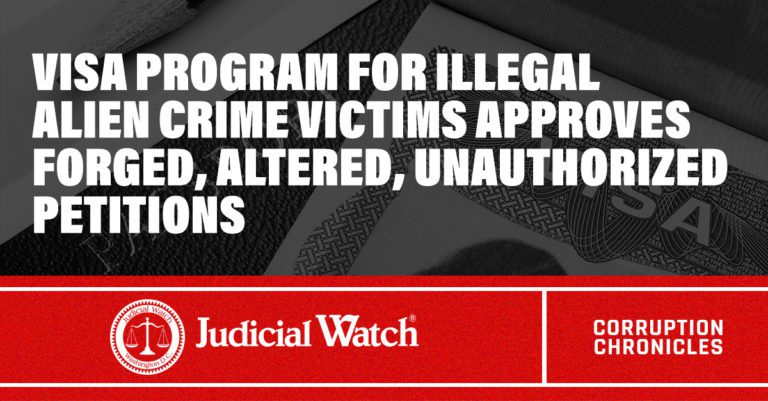

Visa Program for Illegal Alien Crime Victims Approves Forged, Altered, Unauthorized Petitions


A controversial program that awards special visas to illegal immigrants who claim to be victims of crimes in the U.S. rubber stamps petitions with forged, unauthorized, altered, or suspicious law enforcement certifications, according to a scathing federal audit released this month. The probe also discloses that the Homeland Security agency, U.S. Citizenship and Immigration Services (USCIS), that authorizes the visas has for years allowed fraud to go unchecked in the program that receives over 50,000 applications annually. It is known as the U nonimmigrant visa, or simply U visa, and it grants lawful status as well as a path to American citizenship to illegal alien crime victims and their families.
Congress created it in 2000 as part of the Victims of Trafficking and Violence Protection Act to help authorities prosecute criminals with the help of victims in the country illegally who might otherwise not cooperate with police. Though victims of other crimes and those who have suffered “substantial physical or mental abuse” may also qualify, the visa was designed to assist victims of sexual assault, gangs, domestic violence, and human trafficking. In the last few years U visa petitions have grown tremendously, according to government figures, and the Biden administration wants to expand the program even more by raising the annual cap from 10,000 to 30,000 (family members do not count against the cap). That will only add to the huge backlog. It is bad enough that a few years ago USCIS estimated that petitioners would wait more than a decade to receive a U visa if policies and processing procedures remain the same.
While on the waitlist illegal immigrants and their family members receive deferred action or parole and may apply for work authorization. A USCIS publication reveals that 22% of petitioners and 11% of derivatives were previously in deportation proceedings and nearly 10% of those approved required a waiver for fraud or willful misrepresentation. The report also states that in 2010 USCIS implemented a waitlist process due to the growing number of petitioners. By 2019 the agency estimated petitioners would wait north of 10 years to receive a U visa. The overwhelming majority (68%) of U visa applicants come from Mexico, according to figures embedded in the USCIS report. The rest come from Guatemala (7%), El Salvador (6.3%), Honduras (5.3%), India (3%) and Ecuador (1.9%).
To qualify for a U visa applicants must show that they are a victim of a qualifying crime, have information about the crime and are likely to be helpful in the detection or investigation of the crime or the prosecution and conviction of the perpetrator. Victims must submit a signed certification (1-918 form) from a law enforcement official containing basic information about the criminal activity and the victim’s willingness to assist in the detection, investigation, prosecution, conviction or sentencing. The Department of Homeland Security Inspector General (DHS IG), which conducted the latest probe, found that USCIS approved petitions with law enforcement certifications that were unauthorized, forged, altered or suspicious. Investigators from the watchdog’s office contacted law enforcement officials and confirmed in various cases that certifications had forged or unauthorized signatures. It seems that USCIS is not terribly concerned because the IG writes that, even after learning about these serious issues, the agency “did not adequately manage the U visa program” and failed to address “fraud risks.”
As part of the probe, the DHS watchdog surveyed law enforcement officials at dozens of agencies across the nation to determine if the U visa program helps solve crimes. Of 57 certifying law enforcement agencies contacted, “61 percent stated the program does not significantly improve their ability to investigate and solve crimes and 54 percent believe petitioners abuse the program,” the recently published DHS IG report says. Officials at several law enforcement agencies said the U visa program is not helpful because the requests are often for old or closed cases, and in some instances, “staged” crimes, or “exaggerated injuries.” Portions of the report are redacted but the key point is well conveyed. “USCIS’ mismanagement of the U visa program led to questionable petitioners gaining U visa benefits,” the IG writes, adding that the agency has failed to take corrective actions although it acknowledged issues and vulnerabilities years ago.














